Bloemfontein, South Africa

THE BAUMANN FAMILY, BUILDERS OF ONE KIND OR ANOTHER
Amanda Jermyn
Long ago and far away, two young sisters, chosen for their beauty, danced around a statue of liberty in Strasbourg during the French Revolution. This ancestral story has been passed down in the Baumann branch of our family, appearing most recently in the memoirs of the late Penelope Bond.1 Is it true? Probably not, yet I have chosen to tell it because of what it says about us, our family. Perhaps we are simply romantics, embellishers and wishful thinkers, or perhaps this tale explains something of the time and place our ancestors lived in and why they felt it necessary to hold onto a story like that. The point of this tale may be to emphasize how important the Revolution and emancipation by Napoleon would have been to a Jewish family living at that time, important enough that their daughters might dance for joy in the streets. This emancipation made a huge difference to the daily lives and personal freedom of Jews under Napoleon’s rule. Truth comes in many forms - the literal, the fairy tale, and occasionally the sublime. T o me, this is what makes family history so fascinating – not just the names, the places and the dates, but what it tells us about our ancestors, so that we can have a richer sense of our place in history, of who we are and where we came from.
The tale of the Baumanns begins for us in the seventeenth century in the village of Mutzig in Alsace. This is the first place we know for certain that they lived. There is some evidence that the family may have migrated there from Prussia but we do not know this for sure. At the time, many Jews did not have last names, and were known as so-and- so, son of so-and-so. The first ancestor we know of living in Mutzig was Benja min, son of W olff, probably born around 1660. Benjamin’s grandson, Lazare, a second-hand dealer born in 1741, married Bella Reichshoffer from nearby Bouxwiller, and it is amongst their children, all born in Mutzig, that the name “Baumann” first appears, some time before 1808 when last names were required under Napoleon’s rule. One of their sons, Jacques, a shopkeeper and day laborer, married Sara Kuppenheim, a rabbi’s daughter. They had five children: Leopold, Samuel, Joseph, Emmanuel and Balbine. Given the timing of Balbine Baumann’s birth in 1784, she remains the only serious candidate for the story, mentioned earlier, of the Baumann sisters dancing around a statue of liberty during the French Revolution in 1789. Did she have a sister who danced with her? We have no evidence of one, but perhaps it was a friend or a cousin, or perhaps the family was too religious for such frivolity and she never danced at all. Was there such a statue in Strasbourg? I never found one when I went there, and it was certainly not the Statue of Liberty that now graces New York harbor. It’s a good story though, and one that we, as a family, have chosen to keep. As Napoleon himself said, “What is history but a fable agreed upon?”
While Balbine and her brother Leopold remained in Alsace, some time between 1806 and 1807, brothers Samuel, Joseph and Emmanuel moved into Hesse, Germany with Napoleon’s army, providing horses, food, blankets, leather goods and livery to the military. By1808 all three were living in Kassel, serving as contractors to Jerome Napoleon, King of Westphalia, brother of Napoleon Bonaparte. In the Jewish community records of the time, all three brothers are listed as merchants, horse dealers and animal feed dealers.2 At this time they had added the name “Picard”, and were known as the Picard- Baumanns. In those days the word “Picard” was often used simply to mean a person who came from France, and I suspect that it suited my ancestors to be known as such, to show their connection to the conquering armies of Napoleon, both for business reasons and prestige. In later generations, some kept “Picard” while others discarded it. Under the rule of Jerome Napoleon, the family flourished, but in 1815 Napoleon was defeated at Waterloo, and the fortunes of Jews in the lands he had conquered changed. In her book “Memories,” Sophie (Baumann) Leviseur writes: “When Napoleon had been taken prisoner and the French had left Germany, our family grew very poor. Our grandfathers were considered foreigners in Germany and not allowed to do business on their own, so they were only agents, and, besides, they had lost their money when the Prussians had taken possession of all their magazines,3 which were filled with goods which Grandfather (Joseph Baumann) had furnished
1 Penelope Elfrieda Bond’s Memoirs, Unpublished, p. 3.
2 Die Israelitische Gemeinde zu Kassel im 19. Jahrhundert, Helmut Thiele, p. 33, 43, 55, 57, 102, 1986.
3 Storehouses for arms and other supplies for the military
for the French Army.”4 In her unpublished family history, Hannchen Baumann writes that as long as Jerome Napoleon’s kingdom lasted, conditions for the family were excellent: “As Grandmother (Jeanette Seligsberger) often told me, the money was carried in to Grandfather (Joseph Baumann) in wheelbarrows, and to save time, the coins were weighed, not counted.” After things turned bad, “the heads of the families were absolutely unable to keep their families alive... I am proud to say that the families were poor, very poor, but very respectable, and both families were very well-known for their cohesion.” The new regime in Kassel viewed the Baumann brothers as foreigners and wanted to repatriate them and their families to France. However, by this time they had established their large families in Kassel and did not wish to leave their new home.
This type of uncertainty has always spurred Jews to make sure their children are well-educated and have some sort of trade that will serve them well in good times and bad. This is certainly true of the Baumanns. In their memoirs, both Sophie Leviseur and Penelope Bond mention Joseph’s insistence on a trade for his sons. Several of the Baumanns in Kassel, including Joseph’s son Isaac, became watchmakers. Isaac Baumann, however, chose to emigrate, another of the options available to young men in Europe during uncertain political and economic times. According to Sophie Leviseur’s “Memories”5, he arrived in South Africa in 1836 by sailing ship to work as a clerk for the Mosenthals, family friends from Kassel who had established a business in Graaff-Reinet. However, other sources6 maintain that Isaac opened his own trading store in Graaff-Reinet in 1837, becoming the first Jew to settle there. In “The Jewish Community of Graaff- Reinet” we read: “He was well established by the time the Mosenthal brothers, Joseph and Adolph, came to Graaff-Reinet in 1842 from Cape Town and Port Elizabeth to expand their network of trading stores in the Eastern Cape. Baumann’s shop soon became connected with the Mosenthals’ business...”7 Later, Isaac started a business in Colesberg after which he set up shop in Bloemfontein.
In 1845, during a shooting trip with some friends, Isaac first crossed the Orange River where he saw, and was impressed by, the land that would later become the Orange Free State. In 1848, after the Battle of Boomplaats, the Orange River Sovereignty was established there by the British, and Isaac became the first civilian in what would become the city of Bloemfontein. He was the first Jewish settler there, and established the city’s first trading store. In 1849 he became the first mayor of Bloemfontein. After his death, Baumann Square was named after him. According to Sophie Leviseur, when her grandfather Isaac Baumann came to Bloemfontein “... there were scarcely any houses, or bricks to build them with, and very little timber, so his first shop was a tent made of skins with a lean-to where he kept his watches, though there was no manufacturing of watches, only selling and mending.”8
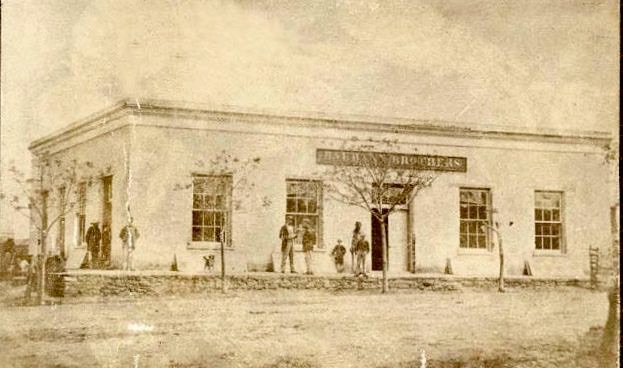
Isaac Baumann’s store on the corner of Henry Street and the then Bo-Kerk street (now Hill Street) The building was sold in 1863 to Standard Bank who still occupies the property.
Once Isaac had established himself in business he brought out from Germany his brothers Jacob and Louis, with whom he formed the trading company Baumann Bros. in Bloemfontein. In 1854 Jacob joined his brother August in Graaff-Reinet where they had formed Baumann Bros. & Co., together with their cousin Joseph, son of Emmanuel Baumann. Louis later headed the Port Elizabeth branch of Baumann Bros. While Jacob and his cousin Joseph eventually returned to Germany, most of the Baumanns and their descendants remained in South Africa, and other Baumanns came out to join their pioneering relatives. Jacob’s son Joseph fought for the Boers in the Bethlehem Commando in the Boer War and was taken prisoner near Bethlehem. Another son, Carel, lived in Brandfort and later Bloemfontein where he was a broker and general dealer. Adolf Baumann, son of Emmanuel, set up shop in Calvinia.
My own connection to the Baumann family is through my great-great grandmother, Zerline Picard-Baumann, daughter of Samuel, one of the three brothers who moved to Kassel with Napoleon’s army. She married Isaak Wertheim in Kassel, and they had four children, Marianne, Hermann, August and Mathilde (my great- grandmother). In about 1863 August and Hermann W ertheim were brought out to work for their Baumann cousins in Graaff-Reinet, arriving on the sailing boat, the Steinwerder. This voyage took place during the American Civil War, and Hermann, then aged 14, recalled seeing the Confederate raider ship, the Alabama, put in to Cape Town.9 In about 1866, August Wertheim opened a general store, Wertheim & Co. General Dealer, in Fauresmith, Orange Free State. Meanwhile, Hermann worked as a salesman for Baumann Bros. in Graaff-Reinet. Later, he and the store’s bookkeeper, Carl Wille, took over the business, calling it Wille & Wertheim.10 Wille later married Helena, daughter of August Baumann. Meanwhile, back in Kassel, Mathilde Wertheim married Isaac Katz, and together they had eight children, including my grandfather, August Katz, born in 1879. In order to help provide an education for the younger children in the family he and his brother Julius were sent to earn a living in South Africa, each at age fifteen. My grandfather set out from Hamburg on a ship called The Pretoria on August 3rd, 1895, arriving at Port Elizabeth in Algoa Bay. In nearby Graaff- Reinet he began helping his uncle Hermann Wertheim in the business he owned with Carl Wille that had previously been Baumann Bros. & Co. He later worked for Saffery & Co. in Humansdorp. During the Boer War, as he was based in British Humansdorp, he fought for the British, while his brother, Julius, based in Boer territory in Fauresmith, fought for the Boers, although this did not in any way diminish their affection for each other. After the war, in 1904, when their uncle retired, my grandfather and his brother Julius bought out August Wertheim’s store in Fauresmith, and ran it together. My father, Robert Katz, who was born in Fauresmith, recalled that his father kept in touch with his Baumann cousins in Bloemfontein, particularly with Isaac Baumann’s daughter, Sophie Leviseur.
4 Memories, Sophie Leviseur, p. 17, 1982
5 Memories, Sophie Leviseur, p. 18, 1982
6 The Jewish Community of Graaff-Reinet, South African
Friends of Beth Hatefutsoth, 1998, p.12-13, and A History of the Jews in South Africa, Louis Herrman, 1935, p. 210.
7 The Jewish Community of Graaff-Reinet, South African Friends of Beth Hatefutsoth, 1998, p.12-13
8 Memories, Sophie Leviseur, p. 19, 1982.
9 Neville Kearns, great-grandson of Edward Wertheim of Graaff-Reinet, provided this information.
10 The Jewish Community of Graaff-Reinet: A Brief History, compiled by South African Friends of Beth Hatefutsoth, 1999, p.14
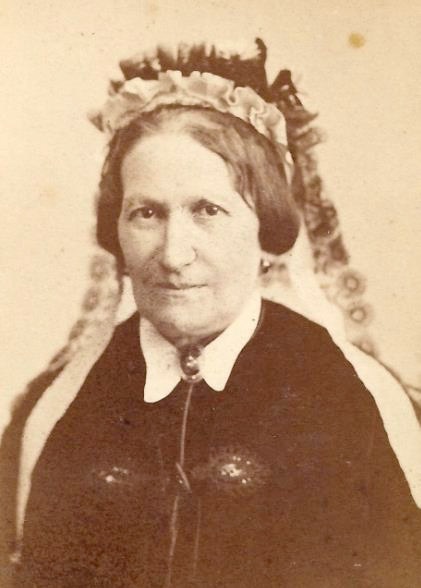
Zerline Picard-Baumann, the writer’s great-great grandmother
In 1852 Isaac Baumann returned to Kassel to see his mother (Jeanette Seligsberger) and to seek a wife. There he married Caroline Allenberg, the 18-year- old daughter of Gumpert Allenberg, a well-known mathematics professor in Kassel. Her mother was Betty Maimon, said to be descended from the famous Jewish philosopher and physician Maimonides. The pioneer life in Bloemfontein, with its dust storms and plagues of locusts, must have been quite a shock for the delicate, cultured young girl, a talented musician who spoke only German and French. Over time, however, she came to enjoy her new life, and the Baumann household on Church Street became a center of culture in Bloemfontein. Caroline and Isaac Baumann had eleven children: Joseph, Alexander, Bertha, Sophie, Gustav, Helen, Alfred, Herbert, Janet, Louis and Otto. They were the first Jewish family in Bloemfontein and played a major role in that city’s development. According to Sophie Leviseur, the children were “...taught to be proud of being Jews, but that was all the religious teaching we had. Our instruction consisted of half an hour of prayer and a little reading every Sunday morning, for which we were dressed as if we were going to church. We had no church to go to.”11
With the onset of the Basuto War Isaac sent his wife and seven children by ox-wagon to Port Elizabeth where he later joined them. During the three years they spent there the children learned English. Until then they knew only Dutch. Herbert, the eighth child, was born in Port Elizabeth, and the last three, Janet, Louis and Otto, were born after the family returned to Bloemfontein in 1865. When Louis died in 1871 at the age of sixteen months, he was buried in a plot of land Isaac purchased next to the Christian cemetery. This became the first Jewish cemetery in the Orange Free State.12 That same year the first Yom Kippur service was held in the Baumann home.13
In 1874, Isaac and Caroline’s daughter Bertha married businessman Henry Adler from Winburg. The wedding of the first Bloemfontein-born girl to be married there was quite a sensation. President Brand declared a half-holiday, and all members of the Volksraad14 attended the wedding. The Reverend Rappaport from Port Elizabeth officiated, and President Brand’s daughter Hannie was a bridesmaid. Bertha would later found the Queen Victoria Hospital in Winburg and the Children’s Undenominational Home in Johannesburg. Her husband Henry, originally from Luebeck, Germany, started a business with his brothers, which became known as Adler Bros. and Escombe. He later became a financier involved in gold mining. The couple had seven children, including Heine who became the general manager of Crown Mines in Johannesburg, Fritz, a brigadier in the South African forces in World War II, and Alice, one of the first professional women journalists in South Africa and the social editor of the Pretoria News.
In 1877 the Reverend Rappaport was again called upon to officiate at a Baumann wedding, this time that of Sophie Baumann and Moritz Leviseur of Bloemfontein. Moritz, originally from Kassel, Germany, had fought with distinction in the Basuto Wars. He was a founder of the Bloemfontein
Chamber of Commerce, helped establish the Volks Hospital and the Bloemfontein Museum, and was active in the Bloemfontein Synagogue. He became a grain and coal merchant with a general store in Bloemfontein, and owned the Halevy House15 Hotel. His wife Sophie became the Grand Dame of Bloemfontein, presiding over a family of eight children and living till 104. Her memoir, “Memories,” her novella “Ouma Looks Back,” and her Boer War diaries are of historic interest, with copies housed in the Bloemfontein War Museum. The Boer War diaries of her daughters Elsa and Clara are housed there too. Sophie Leviseur was a suffragette and founder of the Bloemfontein Jewish Benevolent Society and the Child Welfare Society. She was also a member of the National Museum Commission. Her daughter Elsa was a talented musician, singer, composer and playwright. She married English solicitor Henry Montefiore Cohen and moved to London.
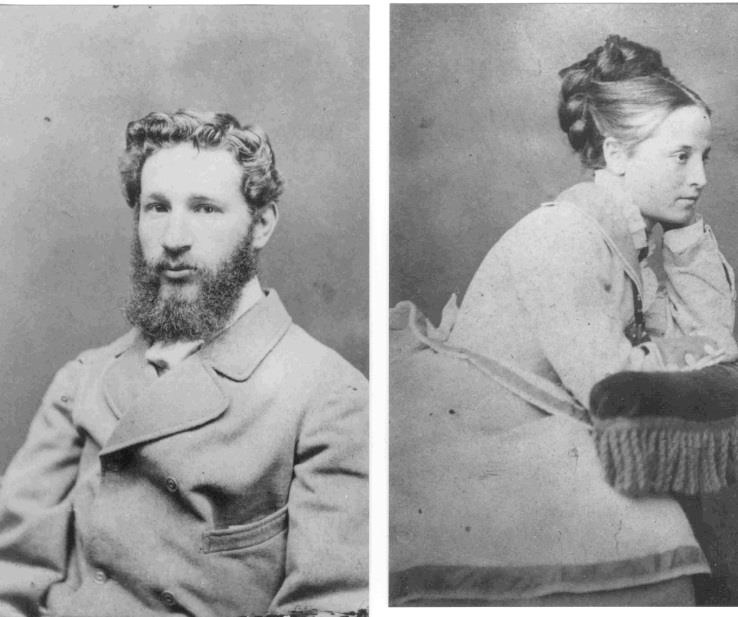
Moritz Leviseur 1842 – 1923 and his wife Sophie Baumann 1857 – 1962
Clara was a suffragette and playwright, known for her play “The Voortrekkers’ Dream.” She married Isidor Douglas Abrahamson. Sophie and Moritz Leviseur’s son Ivan was a land surveyor in Fauresmith and Wepener who fought for the Boers and was injured during the Boer War. Another son, Max, invented a long life battery and sold the idea to the battery company Exide. Sophie’s daughter Josephine married Reginald van Breda Pritchard, a physician and the last United Party MP for Bloemfontein. Sons Ernest Alfred and Herbert were eminent physicians. Herbert qualified at Guy’s
11 Memories, Sophie Leviseur, p. 22, 1982.
12 Address by Dr. Sheila Aronstam at the opening of the
Jewish Community Archives, Bloemfontein, 2001,
taken from her doctoral thesis.
13 Address by Dr. Sheila Aronstam at the opening of the
Jewish Community Archives, Bloemfontein, 2001, taken from her doctoral thesis.
14 Orange Free State Parliament
15 The Leviseur family name was originally Halevy, so Moritz named Halevy House in his family’s honor.
Hospital in London, practiced in Honeydew, Transvaal, and for a while was a ship’s doctor for the Union Castle line. In addition, he wrote and published children’s stories, as well as short novels in Afrikaans. The youngest son, Wilfred (Billie) ran his father’s business after Moritz passed away.
In 1880 Helene, third daughter of Caroline and Isaac Baumann, was married in Bloemfontein by the Reverend Rappaport to Wolf Ehrlich, a businessman, originally from Erfurt, Germany. Ehrlich opened the first shoe shop in Bloemfontein and was a founder of the Bloemfontein Chamber of Commerce. A Member of Parliament in the Orange River Colony, and Senator for the Orange Free State, he was also a three term mayor of Bloemfontein, and for a while, the Portuguese Consul! He helped found the South African Jewish Board of Deputies and was the first President of the Bloemfontein Hebrew Congregation. Helene was a suffragette, and active in the Jewish Women’s Benevolent Society. The Ehrlichs had nine children: Theresa, Minnie, Rosalie, Julian, Hedwig, Henry, Carl Otto, Gladys and Caroline. Rosalie was a well- known theater producer, suffragette and founding member of the South African Communist Party. She won the British Empire Shakespeare Competition and founded the first Afrikaans Eisteddfod. She too wrote her memoirs.
Jeanette (Janet) Baumann, fourth daughter of Isaac and Caroline, married Albert Gottschalk from Magdeburg, Germany. The couple lived in Magdeburg, and had two children, Ernest and Charlotte. According to Ivan Leviseur’s daughter, Margaret Hill, in 1939, Gustav Baumann’s son Hal managed to arrange for Janet and her daughter to be evacuated to South Africa on one of the last boats to leave Germany. Albert and Ernest remained in Germany and, as Jews, were sent to a concentration camp where Albert perished. Ernest survived and later came to join his family in South Africa.
Joseph, the eldest son of Caroline and Isaac Baumann, was educated in Germany. He was a noted gymnast and general dealer in Thaba N’chu, Basutoland. He died there of typhoid at age 31. Their second son, Alexander, was an administrative agent and auctioneer in Winburg. Their third son Gustav, was educated at Grey College, Bloemfontein and at the South African College in Cape Town. He became a legendary figure in South African history - a notable land-surveyor and Surveyor General of the Orange Free State. He
started the firm of G. Baumann and laid out most of the city of Bloemfontein. A street was named after him in Trompsburg. He wrote two books, “The Practice of Land-Surveying” and “The Lost Republic, the Biography of a Land-Surveyor,” the latter together with his daughter, Elfrieda Baumann Bright. On one occasion, on a farm he visited as a land-surveyor, he was asked why he didn’t take part in the religious devotions. Was it because he was a Lutheran? “No, Oom Gert, I’m a Jew,” he replied. To which Oom Gert responded, “Baumann, you lie, you’re a surveyor!”16 Folklore has it that he only went to synagogue after someone called him a “Bloody Jew.”
In 1887 Gustav Baumann married Penelope Bagley in Fauresmith. Her grandfather, Admiral Herman Pieter van Hees, was a nephew of Sir George Yonge, governor of the Cape from 1799-1801. She was descended from the British Plantagenet Royal Family on both sides. During the Boer War, Gustav was on the staff of the Commissariat, involved in military intelligence, and was appointed Under- Secretary of the Orange Free State Boer War Council by President Steyn. He was responsible for introducing the Red Cross and Scouts Corps to the Orange Free State at this time.17 When it became clear that things were going badly for the Boers, before retreating to Kroonstad, President Steyn asked Gustav, as Surveyor General, to remain in Bloemfontein to guard the land titles of the Republic and hand them over to the British, should they occupy the town. This indeed came to pass, and Gustav did as he was asked. After the British took control, he was treated well as a prisoner of war on parole in Cape Town, the only prisoner allowed the entire run of the Cape Peninsula! He was later able to arrange a transfer to Ladybrand where his wife was then living.
After the war he took up land surveying in Bloemfontein once more. By then he was the father of five children: Hermina (Minnie), Maximilian Otto (known as Otto), Elfrieda, Henry and Gurling (Tockie). His youngest child, Alice, was born in 1905. His son Otto, a mining engineer, was a second lieutenant, 70th Squadron, in the Royal Flying Corp, during World War I. When he was killed in action over Flanders in 1917 it broke his father’s heart. Elfrieda, known as Elfie, led an adventurous life. After the untimely and tragic death of her husband, Wilfred Francis Laurie Bright, while serving in the British military on the Pakistan border, Elfie learned to fend for herself and her children. A photographer and skilled carpenter, she served in the army during World War II. Henry, known as Hal, was a Rhodes Scholar, land- surveyor, engineer and the unofficial inventor of the tellurometer18, an electronic distance measurement device. T ockie, a writer, was one of several Baumann family members to pen her memoirs, as did Elfie’s daughter, Penelope Bond. When Gustav passed away in 1930, Bloemfontein lost a much- loved and respected member of the community. Unfortunately, the Anglican Church would not bury him because he was not a Christian, and the Rabbi of the Bloemfontein Synagogue wouldn’t either because Gustav had never belonged to the congregation. In the end, as he had long been a member of the Freemasons, it was they who conducted the funeral.19
16 The Lost Republic, The Biography of a Land- Surveyor, by Gustav Baumann and Elfrieda Bright, Faber and Faber Ltd, 1937, p.92.
17 Boerejode, Jews in the Boer Armed Forces 1899-1902, David Saks, Charlie Fine Printers, 2010, p.20
18 Dr. Trevor Lloyd Wadley of the South African Council for Scientific and Industrial Research took all the credit.
19 Penelope Elfrieda Bond’s Memoirs, Unpublished, p.34 – 35.
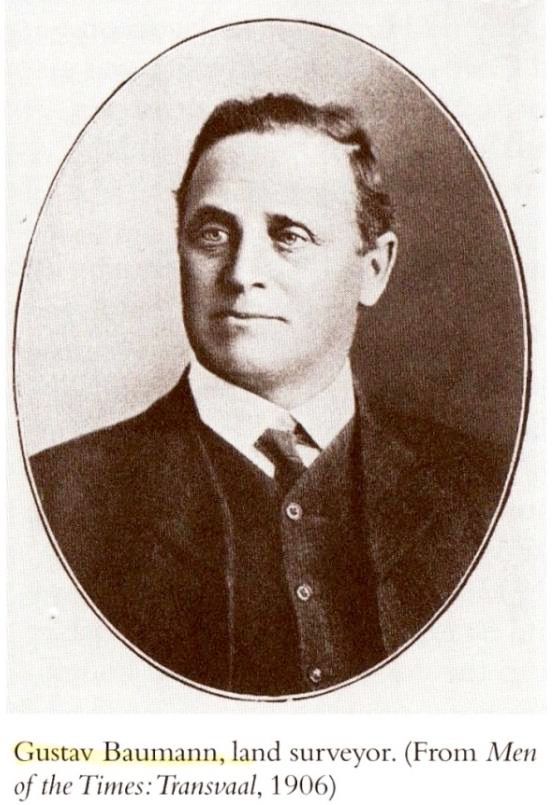
Gustav Baumann, 1858 - 1930
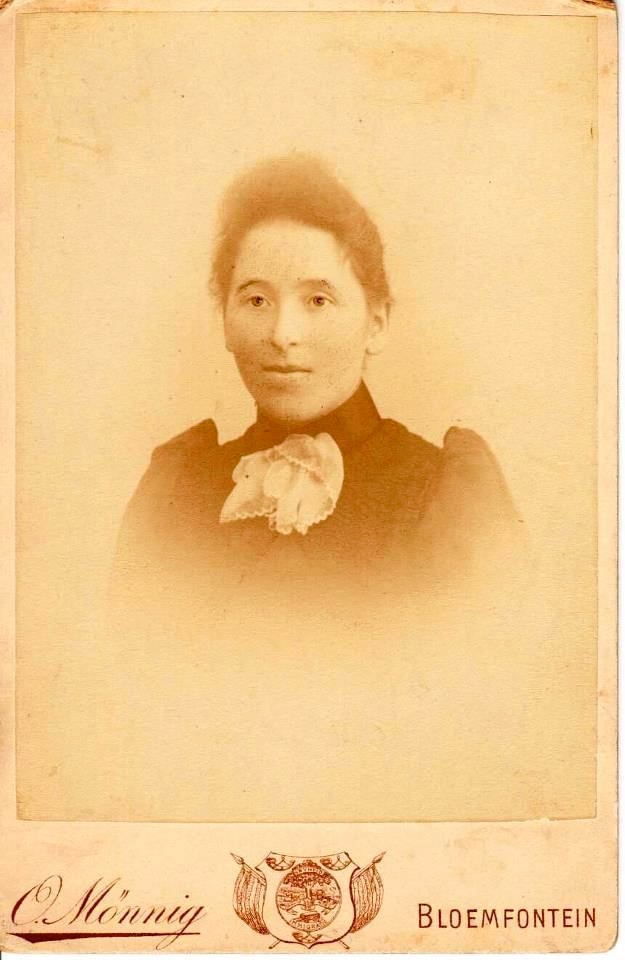
Penelope Georgina Treadwell Bagley, 1865 - 1926
Alfred Moritz Baumann, the fourth son of Isaac and Caroline, received his MD degree from the University of Leipzig in Germany. He later returned to Europe to study ophthalmology and became the first ophthalmic surgeon in Bloemfontein. During the Boer War, he was appointed medical officer in the Bloemfontein concentration camp. He loved this work, but in April 1902 contracted enteric fever and almost died. Happily, he recovered from this illness and survived for many years.20 Alfred was also a singer and composer, establishing an amateur dramatic society in Winburg where he produced Gilbert and Sullivan operas. During a time of religious austerity, he and his brother Gustav provided entertainment for the town in the form of dances, concerts, paper chases and cycling parties.21 Another son, Herbert James Baumann, graduated from Grey College and studied engineering in Germany. He farmed in Winburg, then worked as a clerk in Smaldeel (later known as Theunissen), and managed Wolf Ehrlich’s farm in Ladybrand.22 A veld-cornet, he fought at the Siege of Kimberley and the Battle of Magersfontein and, as a prisoner of war, was sent to St. Helena. He came back almost blind. The youngest child of Isaac and Caroline, Carl Otto, was a life insurance agent in Bloemfontein. He fought at the Battle of Magersfontein, was captured at Paardeberg, and sent to the Green Point prisoner of war camp in Cape Town. At the time, his capture seemed to go against the accepted practices of war as he had been sent under a white flag to alert the British that one of their majors lay seriously wounded near the Boer lines. When his brother Gustav later met the British officer who had captured Carl Otto, the officer explained his reasoning: “I noticed that he was very young, he was intelligent, and an educated man. I knew we were going to bombard Cronje’s laager heavily the next day, and I didn’t want the boy to be in danger. I felt that perhaps I was saving his life.”23
August Baumann, son of Joseph Baumann and Jeanette Seligsberger, married Bertha Rosenstein of Kassel. In 1850 he arrived at the Cape of Good Hope, later moving to Middelburg, Johannesburg and Graaff-Reinet. He was a jeweler, watchmaker and businessman, and eventually retired to Kassel in 1892. He and Bertha had eight children, all of whom were born in South Africa. Their son Richard, who later Anglicized his name to “Bowman,” was the lawyer who drew up the articles for the diamond mining company, De Beers. During the Boer War he was member of the High Commissioner’s Consultative Committee in Cape Town, and also of the Permit Committee that dealt with the granting of permits to Uitlanders24 to return to the Transvaal after the war25. Another son, Lorenzo, traded on the Johannesburg stock exchange and also changed his name to “Bowman.” Yet another son, Emil, was the first doctor in Johannesburg to specialize in the health and welfare of children, and a founder of the Children’s Hospital
20 John Boje, in his thesis on the Winburg district, notes that this is mentioned in G. Saron and H. Hotz, The Jews in South Africa: A History (Cape Town: O.U.P., 1955), p.329.
21 John Boje, in his thesis on the Winburg district, notes that this is mentioned in Baumann and Bright, The Lost Republic, p.140-141.
22 Jewish Life in South African Country Communities, Vol. V, The South African Friends of Beth Hatefutsoth, Johannesburg, 2012, p.50, p.86, p.487, p.517
23 The Lost Republic, The Biography of a Land- Surveyor, by Gustav Baumann and Elfrieda Bright, Faber and Faber Ltd, 1937, p. 178
24 “Uitlanders” (“foreigners” in Dutch) were migrant workers (mainly British) who came to the Transvaal Republic following the Gold Rush of 1886. Resentment of their presence and the limitation of their rights by the Boer republic was a contributing factor to the outbreak of the Second Boer War in 1899.
25 The Jewish Community of Graaff-Reinet, South African Friends of Beth Hatefutsoth, 1998, p. 18.
there. He was a Member of Parliament for Rosettenville, and responsible for the Children’s Act that ended the exploitation of children for adoption. He worked on this with Princess Alice, wife of the Governor General.26 As we have already seen, Bertha and August’s daughter Helena married Carl Wille, bookkeeper for the Baumann store in Graaff-Reinet. This store was later taken over by Wille and my grandfather’s uncle Hermann Wertheim. Another daughter, Sophie, married Carl Hanau, a financier and prospector in Uitenhage, originally from Germany, who later became acting President of the Witwatersrand Chamber of Mines.27
The name “Baumann,” in archaic German, means a farmer, builder or laborer, and I do believe this to be a fitting name for our family. At different times we have been farmers, laborers and builders of one kind or another. My late father, a civil engineer, had his own construction company in Cape Town, so he was a builder too. As we have seen, the pioneering Baumanns played a significant role in the early history and development of South Africa. Other family members who remained in Europe or migrated elsewhere made similar contributions in the places where they lived. Unfortunately, their contributions and those of later generations in South Africa are too numerous to recount in this article. The Baumann family, with its high regard for education, its spirit of adventure, and family cohesiveness, has grown and flourished, with talented descendants spread around the world – in South Africa, America, Canada, England, France, Germany, Israel, Sweden, Australia, New Zealand, Thailand, Zimbabwe and elsewhere. We’ve come a long way from our humble beginnings in Alsace.
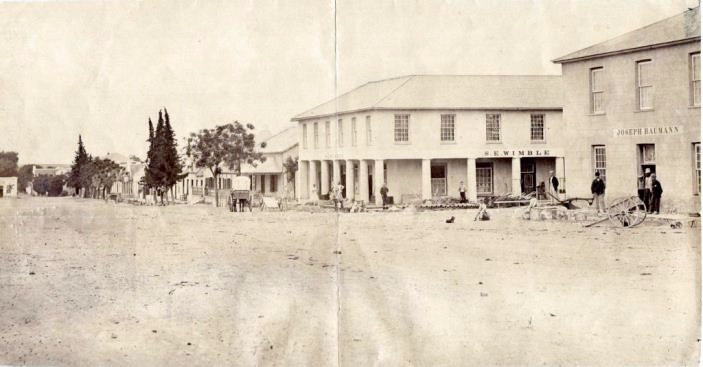
The Joseph Baumann building in Graaff-Reinet, later taken over and renamed Wille & Wertheim
26 The Jewish Community of Graaff-Reinet, South African Friends of Beth Hatefutsoth, 1998, p. 18.
27 The Jewish Community of Graaff-Reinet, South African Friends of Beth Hatefutsoth, 1998, p. 29.
Amanda Katz Jermyn was born and grew up in Cape Town. She and her family have lived in Massachusetts, USA, for many years. A former fiction writer for magazines, she now writes articles on astronomy and is working on a book on her family history. Amanda can be reached at astrogirl200@yahoo.com.
This article was first published in 2014 in Familia, the journal of the Genealogical Society of South Africa, and is republished here with permission.
http://www.jewishgen.org/safrica/newsletter/index.htm#MENU





